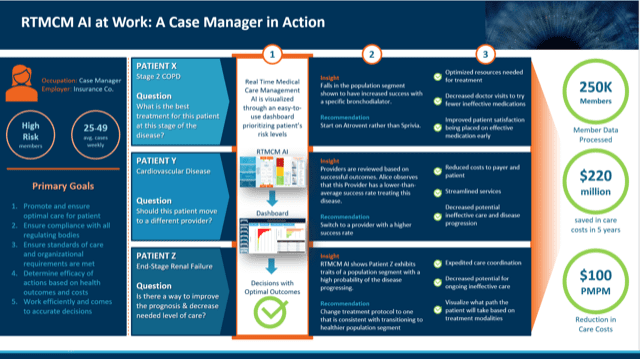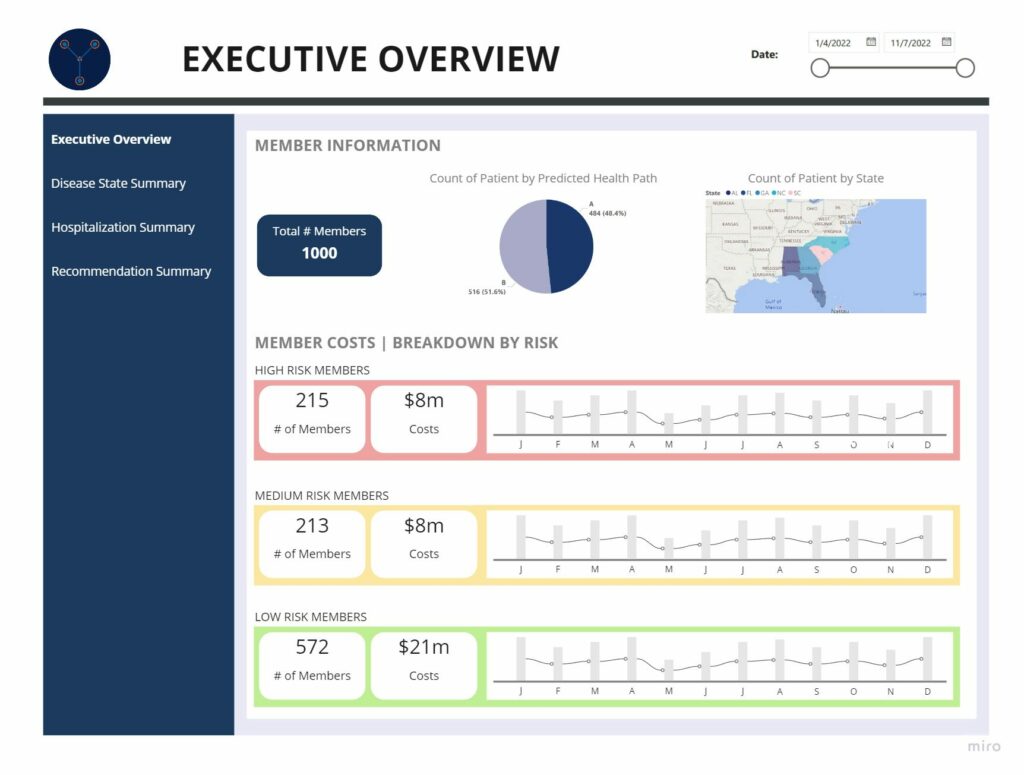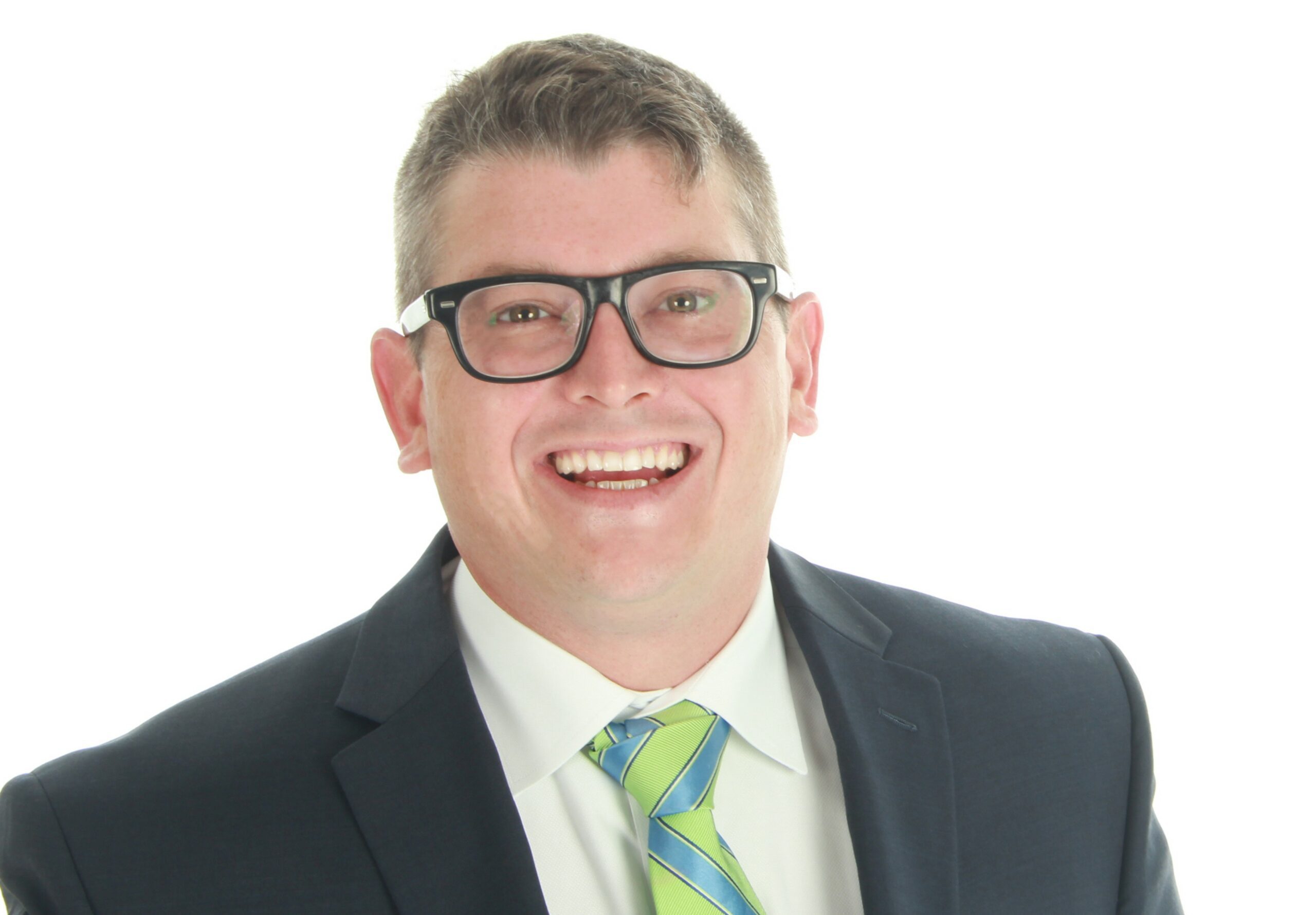By Doreen Hemlock
Health insurance companies have oodles of medical records sitting in their computers. So, why not apply algorithms to that data to forecast the course of diseases for patients, and then, notify doctors to order tests and treatments sooner rather than later, thereby heading off more serious health problems?
That’s part of the vision behind DeLorean Artificial Intelligence, a company in Palm Beach that is using algorithms and machine learning to mine data for Fortune 500 companies to predict future events. It’s now active mainly in healthcare, but also is expanding in sales, fintech and other fields.
Severance “Sev” MacLaughlin founded DeLorean in 2019 after working years in AI for such heavyweights as Cap Gemini and Cognizant Technology Solutions. He saw the opportunity to apply AI strategically at a large scale, and with a background in health, began creating algorithms on select diseases, such as diabetes.
He’s been testing those algorithms on data with health insurance companies, hospitals and others. And he recently got validation from a lab – based on blood tests and hospital follow-ups, that those forecasts are working well, making DeLorean’s product what MacLaughlin calls “the first medical AI to be biologically validated by a third-party review.”
Health insurance giant United Healthcare now is applying DeLorean’s algorithms to its in-house records on 35 million patients, while complying with medical privacy rules, MacLaughlin says.
“With our AI, we know before the doctor knows,” says MacLaughlin [pictured above]. “We know if someone is going to go to the hospital, if someone is going to develop a disease or transition from one disease state to another, and if someone has a disease and they don’t know it. Let me give you an example. Chronic Kidney Disease (CKD) affects 37 million Americans, disproportionately for African-Americans and indigenous people. And 30-40 percent of those people don’t know they have the disease until Stage 3 … So, we identify those people who are ‘unknown’ through our AI algorithm … And we tell the doctor, ‘We think Severance may have CKD Level 2. We recommend he be sent for a urine test to confirm.”
‘The bottom line from this: You get more hugs’
DeLorean began testing its product two years ago and has now processed records for more than 45 million patients for select conditions, from CKD to cardio-vascular disease. This year, it’s adding algorithms for depression, high-risk pregnancy and the lung disease called COPD. The algorithms work together to look at comorbidities and typically run through the database daily or twice a day, says MacLaughlin.
“The bottom line from this: You get more hugs,” MacLaughlin says. With CKD, for instance, “if we catch you in Stage 2, we can keep you there from 10 to 20 years, before you head down the slippery slope to dialysis … This AI extends life. It increases the quality of life. It helps doctors and patients make better medical decisions. And it gives you more hugs.”
Earlier detection and more precise treatment also help reduce medical costs, says MacLaughlin. He estimates savings in Florida for each CKD patient at $15,000 yearly and each diabetes patient at $2,800 annually.
Silicon Valley is taking note. Future-focused analyst Ray Wang of San Francisco-based Constellation Research says DeLorean is “one of the first to bring real-time, predictive medical management together,” making it easier for patients, hospitals and insurance companies to improve healthcare.
“What’s happened in the US healthcare system is that we’ve stopped seeing the patient as a whole [to focus instead on specific medical conditions.] With AI, we have the opportunity for a holistic approach. We can get better healthcare for less,” says Wang, who holds a masters in public health and health finance from Johns Hopkins University. “In the next 10 years, everyone will want their insurance company and hospital group to have this predictive tool.”

Seeking at least $3 million to grow
DeLorean AI, named for the DeLorean car in the movie ‘Back to the Future,’ now employs some 15 people, some in South Florida and others across the United States. It’s raised $3 million to date and is looking to raise at least $3 million more in its first major round of funding, says MacLaughlin.
AI is a long way from MacLaughlin’s roots on a farm in Rhode Island or even his college years majoring in animal science and biochemistry. But while pursuing his PhD in Adelaide, Australia, he found such a large dataset on sheep that he had to master a a main-frame computer. He found computing so powerful that he asked why we don’t use large-scale data analysis for human health and looked into AI.
These days, DeLorean is exploring beyond healthcare to also develop and sell AI products to consumer-products companies. For Mexico-based bakery giant Grupo Bimbo, which owns such US brands as Sara Lee, Entenmann’s and Lender’s Bagels, “we do sales AI. We predict the exact assortment of products in a store per day to maximize sales,” says MacLaughlin.
With additional funding, DeLorean aims to hire more sales and marketing people, hopefully adding 10 to 20 employees and increasing annual revenues beyond $35 million within a year or so. Hiring has been centered on Florida, Texas and Tennessee, where employees pay no state income tax and where many healthcare companies are located. Revenues come from an “AI-as-a-service” model, says MacLaughlin.
Over time, DeLorean sees AI becoming a differentiator for healthcare consumers. Just as patients now ask hospitals about non-invasive surgery and state-of-the-art equipment, he expects patients to query insurers and medical providers: “Do you have this AI technology that can tell me not only that I’m pre-disposed to diabetes, but that if I don’t change my activity, in six months, I’ll have to go on medication?”

- Miami-based People Clerk acquired by larger justice-tech venture - April 5, 2024
- Lessons from accelerators: Nala’s Latin American founders share learnings from Endeavor, eMerge and Techstars Silicon Valley - February 28, 2024
- Miami’s Blackdove highlights digital art for all during Miami Art Week - December 4, 2023




